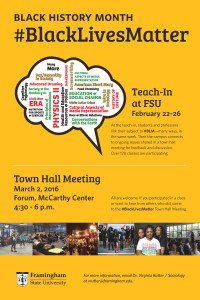
In the midst of the Vietnam War, universities across the country became centers of political dissent against U.S. imperialism abroad and the quagmire that continued for years. Faculty and students galvanized behind anti-war messages that pushed the boundaries of traditional classroom environments. On the 24th of March in 1965, the faculty at the University of Michigan Ann Arbor came together to disrupt business as usual. Over two hundred faculty cancelled classes in favor of anti-war discussions, seminars, and lectures. These open forums lasted hours – upwards of 12 hours at a time – and engulfed the campus in critical discourse. Shortly after, Columbia University adapted a similar model and soon, so did many other schools. This was the birth of the teach-in.
In 2016, a time in our history when the U.S. incarcerates more of its own citizens than any other country, the time for disruption of business as usual at the university is overdue. As the #BlackLivesMatter movement continues to push the socio-political discourses on police brutality, mass incarceration, and the assaults on communities of color, the call for faculty at Framingham State University to connect our classrooms and teaching in alliance with the movement emerged through conversation, and this is the story of a new kind of teach-in we’re holding this week.
When we talked about a teach-in, we paused at the question, how? Like other colleges and universities, our campus includes many students who are tied to full-time or near full-time employment and intensive family commitments. Students, open to learning and activism, are stretched thin by financial and family burdens. Thus, while #BlackLivesMatter teach-ins outside of traditional classrooms have been occurring at other institutions across the country (Cornell and Missouri to name two), our model was centered within our classrooms, and evolved into a campus-wide re-direction of our courses for a week this semester.
The initial conversations was just with me and my soc colleagues. As sociologists, connecting our classrooms with ongoing issues of social justice is routine. Soc classes are (at times) a site for activism, a place that can push learning towards deconstructing power, and a space that offers transformative lenses on the world. Such ideas are not unique to sociology, but for many other disciplines, the connections between social justice, activism, and teaching are not so intrinsic. We knew we could work with sociology. Yet, we wanted to reach across all the disciplines.
My colleague had a simple idea: why not just ask our fellow faculty if they would adapt their Spring course content to relate to the #BlackLivesMatter movement? Would they be willing to adjust their courses during the same week? We asked…and had 30 classes enrolled after a day of mentioning it to colleagues. And now, for the week of February 22-26, over 88 faculty from 30+ disciplines in 143 classes will explicitly link #BlackLivesMatter to their course content and student communities.
The plans have been remarkable. Communication Arts Professor Leslie Starobin will discuss Life Magazine’s coverage of the Civil Rights Movement in the 1960s with her Photojournalism students. Psychology Professor Dawn Vreven’s Cognitive Psychology students will look at research related to implicit bias. Flint, Michigan, is a focus in Biochemistry—as well as in Counseling Psychology. Sociology students are taking on topics ranging from Black lesbian families and respectability politics, to the case for reparations, and the foundations of mass incarceration. Many professors report having changed more than just this week in their classes. Online classes, graduate classes, freshman classes, and senior seminars have all found a way to connect.
Colleagues from disciplines that don’t automatically come to mind have stepped up. Physics professor Vandana Singh and her advanced physics students will examine the status of Black physicists in their field. Economics professor Luis Rosero and his Money and Banking students will look at “The Color of Money” and red lining. Computer scientist David Keil and his Information Technology students will examine the role of phone-videoing and social media in revealing the details of events that have needed to come to light.
The culmination is a Town Hall Meeting on Wednesday, March 2. It is a chance for everyone to hear from others about what they did. Our planning for this event, too, is pretty basic. Students will speak in brief at the beginning about the origins and influence of the #BlackLivesMatter movement. The central activity is people sharing their teach-in experiences from the past week—rather than some kind of panel or lecture. The creation of a common space after the week of teach-in courses bridges faculty innovation, student engagement, and activism. Holistically, hundreds of distinct classroom environments from a multitude of applied perspectives will come together to deepen our community’s commitment to the #BlackLivesMatter mission. Rather than a “conclusive” event, the Town Hall Meeting will involve addressing not only where we are in the present but also where we are going.
There will be other days for panels, structured dialogue, lectures, and more planning and other focused and topical demonstrations. Students are developing a speakers’ bureau to continue focused dialogues in dorms, clubs, and classrooms. But, this day is for students and faculty to see how vast and wide the significance of #BlackLivesMatter and to consider deeper engagement. My colleagues Virginia Rutter, Lina Rincón, and Patricia Sanchez-Connally were partners in growing this idea. I’ll report back how it goes. The creation of the necessary spaces, dialogues, and momentum is the spark that bridges classrooms with activism.
Xavier Guadalupe-Diaz, PhD, is Assistant Professor of Sociology at Framingham State University in Framingham, MA.

Comments